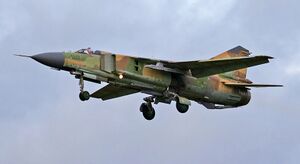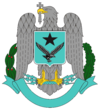AFASF-10 Donnola Air Superiority Fighter: Difference between revisions
mNo edit summary |
m (→Variants) |
||
| (6 intermediate revisions by the same user not shown) | |||
| Line 14: | Line 14: | ||
|introduction = | |introduction = | ||
|introduced = 10 June 1965 | |introduced = 10 June 1965 | ||
|retired = 5 May 1985 (CRAF) | |retired = 5 May 1985 (CRAF; as fighter) | ||
|status = In limited service | |status = In limited service | ||
|primary user = [[Image:CRAFFlag.png|border|22px]] [[Cacertian Royal Air Fleet]]<br>[[Image:RIAFFlag.png|border|22px]] [[Ruvelkan Imperial Air Force]] | |primary user = [[Image:CRAFFlag.png|border|22px]] [[Cacertian Royal Air Fleet]]<br>[[Image:CRNFlag.png|border|22px]] [[Cacertian Royal Navy]]<br>[[Image:RIAFFlag.png|border|22px]] [[Ruvelkan Imperial Air Force]] | ||
|more users = | |more users = | ||
|produced = 1962—1986 | |produced = 1962—1986 | ||
|number built = | |number built = | ||
|program cost = | |program cost = | ||
|unit cost = | |unit cost = | ||
|developed from = | |developed from = | ||
|variants with their own articles = | |variants with their own articles = AFASF-10P (NSF-11)<br>AFASF-10E<br>AFASF-10GE<br>AFASF-10M | ||
}} | }} | ||
|} | |} | ||
| Line 29: | Line 29: | ||
The '''Ersilia AFASF-10 ''Donnola''''' ('''Weasel''') is a third-generation, {{wpl|variable-sweep wing}} {{wpl|fighter aircraft}} that was designed by Ersilia Defense and Aeronautics in the 1960s. It was the first Cacertian aircraft equipped with a {{wpl|look-down/shoot-down}} radar and {{wpl|Beyond-visual-range missile|beyond-visual-range missiles}}. The Donnola served as the mainline fighter of the [[Cacertian Royal Air Force]] from its introduction in 1965 until being replaced by the [[AFASF-12 Drago Air Superiority Fighter|AFASF-12 Drago]] in 1983. | The '''Ersilia AFASF-10 ''Donnola''''' ('''Weasel''') is a third-generation, {{wpl|variable-sweep wing}} {{wpl|fighter aircraft}} that was designed by Ersilia Defense and Aeronautics in the 1960s. It was the first Cacertian aircraft equipped with a {{wpl|look-down/shoot-down}} radar and {{wpl|Beyond-visual-range missile|beyond-visual-range missiles}}. The Donnola served as the mainline fighter of the [[Cacertian Royal Air Force]] from its introduction in 1965 until being replaced by the [[AFASF-12 Drago Air Superiority Fighter|AFASF-12 Drago]] in 1983. | ||
Large numbers of the Donnola were sold to [[Ruvelka]] in the | Large numbers of the Donnola were sold to [[Ruvelka]] in the early 1970s where it also served as the [[Ruvelkan Imperial Air Force|Imperial Air Force’s]] main fighter aircraft. While it has largely been superseded by Dragos in RIAF service, large portions of the Donnola fleet were pressed into service during the [[Zemplen War]] with many serving as reconnaissance and electronic warfare aircraft. They continue to serve in a limited role in the RIAF today. | ||
==Development== | ==Development== | ||
| Line 41: | Line 41: | ||
==Variants== | ==Variants== | ||
;AFASF-10 | |||
The original production variant of the Donnola. | |||
;AFASF-10P (NSF-11) | |||
In 1966, Ersilia developed the '''''P'''ortaerei'' variant of the Donnola which became the primary carrier-borne fighter of the [[Cacertian Royal Navy]] until the introduction of the [[NSF-12 Albatro Strike Fighter|NSF-12 Albatro]]. The AFASF-10P also fulfilled a ground-attack role unlike the original Donnola. | |||
;AFASF-10E | |||
The 10E ('''''E'''sportazione'') was developed in 1970 after Ersilia was approached by representatives of the [[Ruvelkan Imperial Air Force]] who expressed interest in purchasing the Donnola. Instead of the Cacertian-built electronic suite, Ruvelka provided the necessary components. | |||
;AFASF-10GE ''Donnola Nera'' | |||
The 10GE ('''''G'''uerra '''E'''lettronica'') is an electronic warfare variant of the Donnola that first entered service with the Cacertian Royal Navy in 1971. It was developed from the AFASF-10P at the request of the Navy for a carrier-based electronic warfare and electronic countermeasure aircraft to support a carrier strike wing's fighters. It was later adopted by the Air Fleet in 1973 and is in the only variant of the Donnola still in service with the Cacertian Armed Forces. | |||
;AFASF-10M | |||
In 1977, Ersilia began developing the [[AFASF-12 Drago Air Superiority Fighter|AFASF-12 Drago]] utilizing knowledge of the Donnola’s combat performance in the [[Hayren War]] against the Syaran-built [[Nephele]]. Taking into account the Donnola’s poor dogfighting abilities, Ersilia developed the AFASF-10M ('''''M'''igliorato'') as a stop-gap while development of the Drago was ongoing. The 10M had vastly improved controls and avionics that allowed it to perform somewhat better in the dogfighting role. | |||
==Operators== | ==Operators== | ||
===Current Operators=== | ===Current Operators=== | ||
* {{flag|Ruvelka}}; [[Ruvelkan Imperial Air Force]]—166 currently listed as part of the RIAF’s inventory. Many of these remaining Donnola’s have been converted to house advanced ECM suites. | * {{flag|Cacerta}}; [[Cacertian Royal Air Fleet]], [[Cacertian Royal Navy]]—The electronic warfare variant of the Donnola remains in service with both the Air Fleet and Navy. | ||
* {{flag|Ruvelka}}; [[Ruvelkan Imperial Air Force]]—166 currently listed as part of the RIAF’s inventory. Many of these remaining Donnola’s have been converted to the 10GE and house advanced ECM suites. | |||
===Former Operators=== | ===Former Operators=== | ||
* {{flag|Cacerta}}; [[Cacertian Royal Air Fleet]]—The CRAF retired the Donnola in 1985. Much of its fleet was sold or scrapped. | * {{flag|Cacerta}}; [[Cacertian Royal Air Fleet]]—The CRAF retired the Donnola as a frontline fighter in 1985. Much of its fleet was converted, sold, or scrapped. | ||
==Specifications== | ==Specifications== | ||
| Line 72: | Line 86: | ||
* '''Guns:''' 1 × 23 mm with 260 rounds | * '''Guns:''' 1 × 23 mm with 260 rounds | ||
* '''Payload:''' 3,000 kg (6,600 lbs) across wing, wing-glove, and fuselage pylons | * '''Payload:''' 3,000 kg (6,600 lbs) across wing, wing-glove, and fuselage pylons | ||
{{Cacertian Combat Aircraft}} | |||
[[Category:Cacerta]] | [[Category:Cacerta]] | ||
Latest revision as of 18:00, 15 July 2021
This article is incomplete because it is pending further input from participants, or it is a work-in-progress by one author. Please comment on this article's talk page to share your input, comments and questions. Note: To contribute to this article, you may need to seek help from the author(s) of this page. |
| Ersilia AFASF-10 Donnola | |
|---|---|

| |
| A Ruvelkan Donnola on approach to land. | |
| Role | Fighter aircraft |
| National origin | |
| Manufacturer | Ersilia Defense and Aeronautics |
| First flight | 2 April 1962 |
| Introduction | 10 June 1965 |
| Retired | 5 May 1985 (CRAF; as fighter) |
| Status | In limited service |
| Primary user | |
| Produced | 1962—1986 |
| Variants | AFASF-10P (NSF-11) AFASF-10E AFASF-10GE AFASF-10M |
The Ersilia AFASF-10 Donnola (Weasel) is a third-generation, variable-sweep wing fighter aircraft that was designed by Ersilia Defense and Aeronautics in the 1960s. It was the first Cacertian aircraft equipped with a look-down/shoot-down radar and beyond-visual-range missiles. The Donnola served as the mainline fighter of the Cacertian Royal Air Force from its introduction in 1965 until being replaced by the AFASF-12 Drago in 1983.
Large numbers of the Donnola were sold to Ruvelka in the early 1970s where it also served as the Imperial Air Force’s main fighter aircraft. While it has largely been superseded by Dragos in RIAF service, large portions of the Donnola fleet were pressed into service during the Zemplen War with many serving as reconnaissance and electronic warfare aircraft. They continue to serve in a limited role in the RIAF today.
Development
Design
Operation History
Variants
- AFASF-10
The original production variant of the Donnola.
- AFASF-10P (NSF-11)
In 1966, Ersilia developed the Portaerei variant of the Donnola which became the primary carrier-borne fighter of the Cacertian Royal Navy until the introduction of the NSF-12 Albatro. The AFASF-10P also fulfilled a ground-attack role unlike the original Donnola.
- AFASF-10E
The 10E (Esportazione) was developed in 1970 after Ersilia was approached by representatives of the Ruvelkan Imperial Air Force who expressed interest in purchasing the Donnola. Instead of the Cacertian-built electronic suite, Ruvelka provided the necessary components.
- AFASF-10GE Donnola Nera
The 10GE (Guerra Elettronica) is an electronic warfare variant of the Donnola that first entered service with the Cacertian Royal Navy in 1971. It was developed from the AFASF-10P at the request of the Navy for a carrier-based electronic warfare and electronic countermeasure aircraft to support a carrier strike wing's fighters. It was later adopted by the Air Fleet in 1973 and is in the only variant of the Donnola still in service with the Cacertian Armed Forces.
- AFASF-10M
In 1977, Ersilia began developing the AFASF-12 Drago utilizing knowledge of the Donnola’s combat performance in the Hayren War against the Syaran-built Nephele. Taking into account the Donnola’s poor dogfighting abilities, Ersilia developed the AFASF-10M (Migliorato) as a stop-gap while development of the Drago was ongoing. The 10M had vastly improved controls and avionics that allowed it to perform somewhat better in the dogfighting role.
Operators
Current Operators
 Cacerta; Cacertian Royal Air Fleet, Cacertian Royal Navy—The electronic warfare variant of the Donnola remains in service with both the Air Fleet and Navy.
Cacerta; Cacertian Royal Air Fleet, Cacertian Royal Navy—The electronic warfare variant of the Donnola remains in service with both the Air Fleet and Navy. Ruvelka; Ruvelkan Imperial Air Force—166 currently listed as part of the RIAF’s inventory. Many of these remaining Donnola’s have been converted to the 10GE and house advanced ECM suites.
Ruvelka; Ruvelkan Imperial Air Force—166 currently listed as part of the RIAF’s inventory. Many of these remaining Donnola’s have been converted to the 10GE and house advanced ECM suites.
Former Operators
 Cacerta; Cacertian Royal Air Fleet—The CRAF retired the Donnola as a frontline fighter in 1985. Much of its fleet was converted, sold, or scrapped.
Cacerta; Cacertian Royal Air Fleet—The CRAF retired the Donnola as a frontline fighter in 1985. Much of its fleet was converted, sold, or scrapped.
Specifications
General Characteristics
- Crew: 1
- Length: 16.7 m (54 ft 9 in)
- Wingspan: 13.97 m (45 ft 10 in) fully spread; 7.78 m (25 ft 6 in) fully swept
- Height: 4.82 m (15 ft 10 in)
- Wing Area: 37.35 m² (402 ft²) fully spread; 34.16 m² (367.16 ft²) fully swept
- Gross Weight: 14,840 kg (32,717 lbs)
- Max Takeoff Weight: 17,800 kg (39,242 lbs)
- Powerplant: 1 × EDA-1962 Afterburning Turbojet
Performance
- Maximum Speed: Mach 2.35 (2,499 km/h, 1,553 mph) at altitude
- Range: 1,900 km (1,200 mi, 1,000 nmi)
- Combat Range: 1,500 km (930 mi, 810 nmi) with standard weapons load; 2,550 km (1,580 mi, 1,380 nmi) with standard weapons load and three drop-tanks
- Ferry Range: 2,820 km (1,750 mi, 1,520 nmi) with three drop-tanks
- Service Ceiling: 18,300 m (60,000 ft)
- Rate of Climb: 230 m/s (45,000 ft/min)
Armament
- Guns: 1 × 23 mm with 260 rounds
- Payload: 3,000 kg (6,600 lbs) across wing, wing-glove, and fuselage pylons
